Jul 2021 1st Edition
Jul 2021 1st Edition Londekile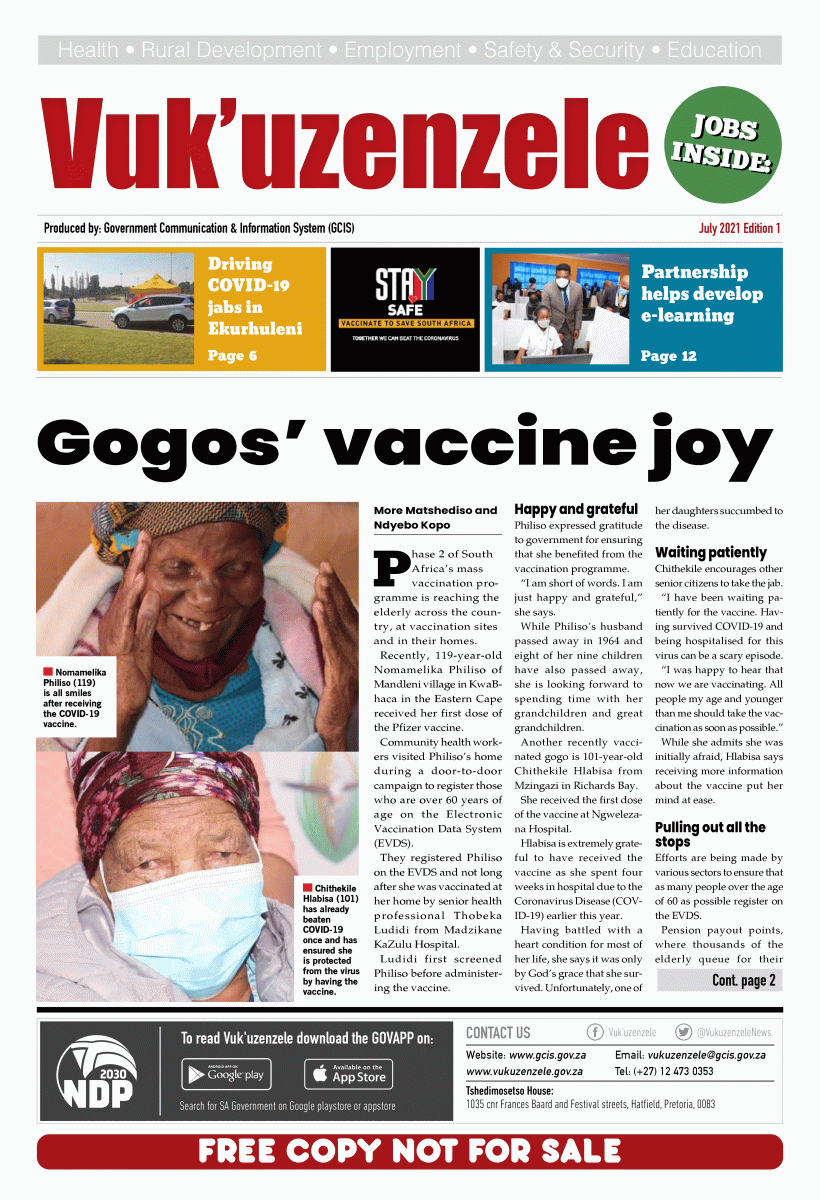
Translations
Afrikaans
isiNdebele
isiXhosa
isiZulu
Sepedi
Sesotho
Setswana
Siswati
Tshivenda
Xitsonga
AwezaMed bridges COVID-19 language divide
AwezaMed bridges COVID-19 language divide SiboneloAn innovative language app is helping ensure that South Africans receive Coronavirus Disease (COVID-19) information in a language they are familiar with, potentially saving lives.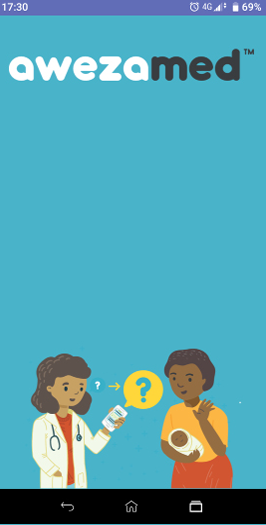
The local mobile app, AwezaMed, is aimed at breaking down language barriers to improve safety protocols, communication and other COVID-19-related information.
According to the Department of Higher Education, Science and Innovation, language remains a serious challenge in conveying this life-saving information during the deadly pandemic, especially in a country like South Africa with 11 official languages.
Multilingualism is vital to ensure healthcare professionals and patients understand each other and the voice-enabled AwezaMed app will help to make this possible.
“In the context of healthcare, it is common that the healthcare provider and patient often do not share a common language.
“This results in serious challenges, such as a poorer patient experience, incorrect diagnoses, increased stress levels for the patient and misunderstandings about post-consultation self-care instructions,” says Higher Education, Science and Innovation Minister Dr Blade Nzimande.
AwezaMed was developed by the department’s entity, the Council for Scientific and Industrial Research.
It features localised technology, such as speech recognition, text-to-speech and machine translation.
“The app enables healthcare providers to access a phrase in English, translate it into any South African official language and play the phrase in the selected language,” says the Minister.
The content of the app was developed in collaboration with health experts.
The app, which currently works on any Android smartphone, also has a database of over 1 800 questions, reassurances, explanations, patient responses and key vocabulary curated by a team of medical professionals.
In addition, automatic speech recognition allows for the recognition and transcription of speech in any of the 11 official languages, while machine translation takes input text in the source language and translates it into the target language.
The Minister believes the app holds potential benefits for the public health sector beyond COVID-19, as it will go a long way towards improving trust between healthcare providers and patients, allowing for more diagnoses that are accurate and save lives.
AwezaMed can be accessed free on the Google Play Store at http://play.google.com/store/apps/details?id=za.co.aweza.covid19. – SAnews.gov.za
Be part of the change
Be part of the change SiboneloThis Nelson Mandela International Day South Africans are urged to ignite the embers of ubuntu and tackle food insecurity by working together. 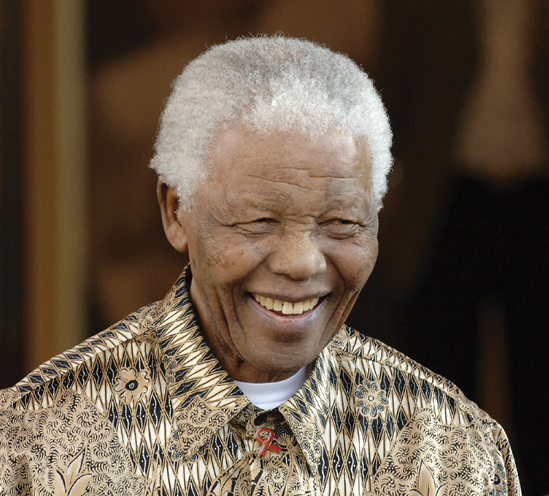
Nelson Mandela International Day, celebrated annually on 18 July, will focus on the fight against poverty this year and will be commemorated under the theme: One Hand Can Feed Another.
Nelson Mandela International Day is commemorated on the former President’s birthday and is celebrated across the world every year under a different theme that is inspired by his values and aspirations for people from all walks of life.
In 2005, Madiba said: “As long as poverty, injustice and gross inequality exist in our world, none of us can truly rest.”
Nelson Mandela Foundation spokesperson Luzuko Koti says that as the country fights the Coronavirus Disease (COVID-19), these are important words to remember.
She adds that Mandela would have wanted to help those in dire need survive during this difficult period.
“COVID-19 has come with a devastating loss of life, exposed the fragility of health systems and aggravated food insecurity for many communities.
“Millions of livelihoods have been lost and people have become increasingly dependent on one another to survive,” says Koti.
The foundation launched the Each1Feed1 programme last year, to meet the immediate needs of the country's most vulnerable communities.
“With Mandela Day 2021, we will continue to address the immediate challenge of families in our communities that do not have access to food. In the long term, Mandela Day is committed to tackling the systemic challenge of food insecurity.”
Koti urges South Africans to extend a helping hand them to those around them.
“We call on you to be an active citizen in your community, individually or as part of one of the millions of groups getting together to start initiatives around delivering food parcels, making masks and protective gear, teaching on-line or making donations towards these efforts,” says Koti.
Celebrate Mandela Day
There are various ways that you can make a difference this Nelson Mandela International Day.
Volunteer: Mandela strongly advocated helping each other. Go out in your community and lend a hand by volunteering.
Support a charity: There are a number of charities that contribute to the initiatives that were close to Mandela’s heart. Find a charity and contribute to the cause.
For more information about Nelson Mandela International Day, visit www.nelsonmandela.org
Bursaries available for youth
Bursaries available for youth LondekileThe Department of Water and Sanitation has called on Grade 12 learners interested in pursuing qualifications related to the water sector to apply for its bursaries.
“Bursary applications for students with an interest in science and engineering disciplines are currently open.
“We urge Grade 12 learners particularly to apply, as we are in dire need of young and innovative minds to join the sector,” says the department’s spokesperson, Sputnik Ratau.
Applications opened on 1 June 2021 and will close on 31 October 2021.
The bursaries cover full tuition fees, accommodation and food as per university guidance, books and stationery allowance and a monthly stipend.
The department will allocate bursaries to students after taking into consideration academic performance, financial need and the relevant skills set for the water and sanitation sector.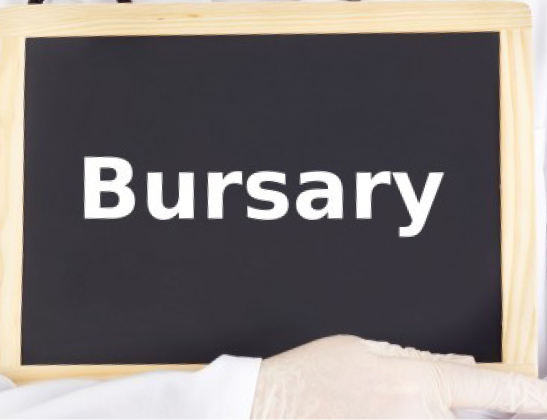
“Through the bursaries offered to students, the department then provides employment contracts, during which the bursars get relevant workplace exposure and additional training until they are ready to register as professionals with their relevant professional bodies,” Ratau says.
For 2022, the department says it will consider applications for first and second year of study, only for the following qualifications:
- BSc (Bachelor of Science)/BEng in Civil, Mechanical and Electrical.
- BSc (Hons) in Civil, Mechanical and Electrical.
- BSc in Hydrology, Geohydrology, Environmental Management, Project Management, Environmental Sciences and Environmental and Water Sciences.
- BSc (Hons) in Hydrology, Geohydrology, Environmental Management, Project Management, Environmental Sciences and Environmental and Water Sciences.
- National Diploma/BEng Tech in Civil Engineering, Mechanical Engineering, lectrical Engineering (Heavy Current), National Diploma in Water Care and Environmental Management and Biochemistry.
“Our bursaries mainly target previously disadvantaged and impoverished persons from poverty-stricken and rural communities.
“We are also encouraging students with disabilities to make use of this opportunity and send through their applications,” Ratau says. -SAnews.gov.za
Application forms can be accessed at:
https://www.dws.gov.za/LearningA/Doc/2022%20DWS%20External%20Bursary%20…
Once completed, the bursary application forms can be sent by email to
bursaries@dws.gov.za. For more information, visit the department’s website – www.dws.gov.za.
COVID-19 third wave triggers new restrictions
COVID-19 third wave triggers new restrictions SiboneloSouth Africans will have to adhere to stricter lockdown regulations as government takes precautions to deal with the third wave of the Coronavirus Disease (COVID-19). 
President Cyril Ramaphosa placed the country on Alert Level 3 to stem the rising infections.
“We have to act decisively and quickly to save lives,” said the President, in an address to the nation.
Four provinces – Gauteng, Free State, North West and Northern Cape – are officially in a third wave, while others are not far behind. Gauteng has been the worst hit.
“The increase in infections in Gauteng is now faster and steeper than it was at the same time in previous waves.
“Within a matter of days, it is likely that the number of new cases in Gauteng will surpass the peak of the second wave. Private hospitals in the province have reported that they are near capacity,” added President Ramaphosa.
He said that based on experience from the previous two waves and from around the world, when health facilities are overwhelmed more lives are lost.
For this reason, at this stage government’s priority is ensuring there are enough hospital beds, health workers, ventilators and oxygen to give the best possible care to every person who needs it.
Restrictions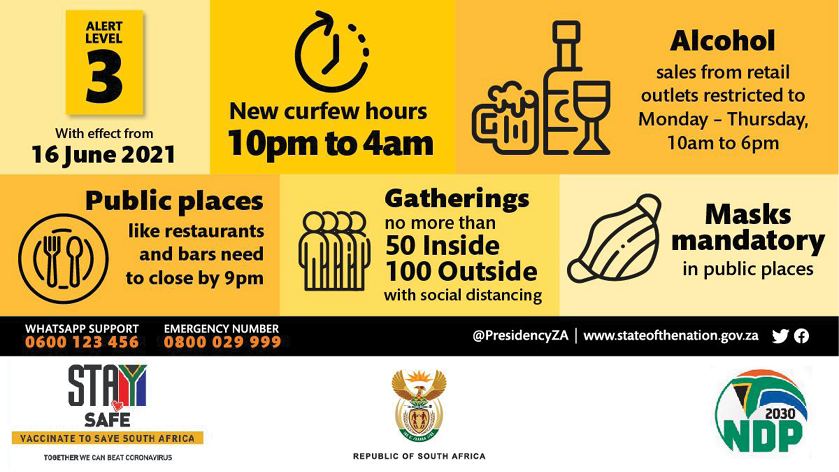
“The massive surge in new infections means that we must once again tighten restrictions on the movement of persons and gatherings,” he explained.
The move to Alert Level 3 means that:
- The hours of curfew start at 10pm and end at 4am.
- Non-essential establishments like restaurants, bars and fitness centres must close by 9pm to allow their employees and patrons to travel home before the start of the curfew.
- All gatherings have been limited to a maximum of 50 people indoors and 100 people outdoors. Where the venue is too small to accommodate these numbers with appropriate social distancing, then no more than 50% of the capacity of the venue may be used. This includes religious services, political events, social gatherings, restaurants, bars, taverns and similar places.
- Attendance at funerals and cremations cannot exceed 50 people and all social distancing and health protocols must be observed. Night vigils, after-funeral gatherings and ‘after-tears’ gatherings are not allowed.
- The sale of alcohol from retail outlets for off-site consumption is only permitted between 10am and 6pm from Monday to Thursday. This excludes public holidays. Alcohol sales for on-site consumption is permitted as per licence conditions up to 9pm. Alcohol consumption in all public spaces is strictly forbidden.
Saving lives
President Ramaphosa said government has been careful to ensure that it acts appropriately and timeously to protect lives and the economy.
“We have therefore closely monitored the data and heeded the advice of our experts and scientists.
“The measures we are putting in place now are appropriate to the level of risk and necessary to save lives.”
He stressed that several important measures remain in place under Alert Level 3.
“It remains mandatory for every person to wear a face mask that always covers their nose and mouth at all times when in public spaces. It is a criminal offence not to do so.”
The owners and managers of public buildings, centres, shops, restaurants, taxis and buses must ensure that people on their premises or in their vehicles wear masks.
Vaccination drive
South Africa’s vaccination drive has experienced a number of delays since it was rolled out.
Phase one of the programme resulted in 480 000 health workers receiving the Johnson & Johnson (J&J) vaccine.
Phase two of the programme has seen health workers and people over the age of 60 receiving the first dose of the Pfizer vaccine.
South Africa's supply of the J&J vaccine was held up by an investigation into contamination of ingredients at a supplier factory in Baltimore in the United States that saw around 60 million doses affected worldwide.
The President said the problems with the J&J vaccine have now been resolved.
“As a result of these problems, two million doses that had already been produced are unusable. The Aspen plant in Gqeberha in the Eastern Cape is now able to go ahead and produce new doses.”
About two million J&J vaccines were expected to be delivered to South Africa by the end of the June.
“The initial doses we receive from J&J will be used to vaccinate educators in our schools and thereafter security personnel on the frontline,” explained President Ramaphosa.
By the end of June, South Africa was also expected to have received a total of 3.1 million Pfizer doses.
The President urged all South Africans over the age of 60 to register on the Electronic Vaccination Data System and get vaccinated without delay.
Children need both parents
Children need both parents LondekileThe Department of Social Development calls on parents to play an active role in their children’s lives.
The absence of one parent could have a negative impact on children, as they face an increased risk of developing behavioural challenges.
This is according to the Department of Social Development, which adds that many children in South Africa live without their parents’ support, which compromises their rights to protection and care.
“Some of these children live in child-headed, youth-headed and grandparent-headed households and some, if not most, are being raised by one parent – in the majority, by their mothers,” the department says.
It adds that there are negative social and economic effects that are prevalent in families where one parent is absent.
The department says children have a right to both parents, irrespective of whether they are separated or divorced and regardless of who has a custody.
“The upbringing of children should be the full responsibility of both parents, unless a court determines otherwise.”
In 2018, Statistics South Africa published the ‘Children’s education and well-being in South Africa’ report, which focused on children under the age of 18.
It revealed that only 31.7% of black children stayed with their biological fathers, compared to 51.3% (coloured), 86.1% (Indian or Asian) and 80.2% (white). In these four race groups, between 74% and 92.6% of children live with their mothers.
Tips for parents
Refilwe Kgoete, a Social Worker at Agisanang Domestic Abuse Prevention and Training, says a separation or divorce does not only affect parents, but can be devastating for children too.
Co-parenting is a better solution to protect children from suffering.
“Having a co-parenting schedule in place is one way parents can still be part of their children’s lives, even after separation or divorce.
“This requires that the two parties put their emotions aside, focus on what their children need and act in the children’s best interest,” says Kgoete.
Co-parenting ensures that children spend time with both parents in a healthy environment.
Time spent with both parents is important for creating family bonds and will help children develop socially and emotionally. It will also help them develop healthy relationships in adulthood, she says.
Kgoete advises parents to use technology when physical contact is a challenge, by using frequents voice and video calls to communicate with their children.
Driving COVID-19 jabs in Ekurhuleni
Driving COVID-19 jabs in Ekurhuleni SiboneloSouth Africa has launched its first drive-through COVID-19 vaccination site.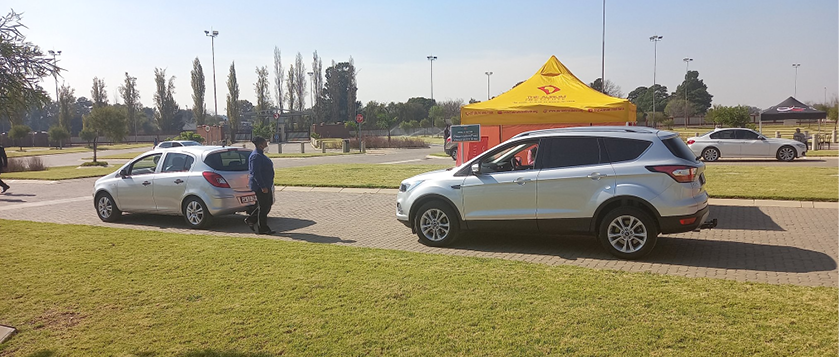
Ekurhuleni residents have the option to get their Coronavirus Disease (COVID-19) vaccinations in the comfort of their cars, after the country’s first drive-through vaccination site was launched in Boksburg, Gauteng.
Residents who registered on the Electronic Vaccine Data System (EVDS) and selected the International Christian Family Church as their vaccination site are receiving their vaccines without having to step out of their car to queue.
Johan van der Vyver, the first community member to get his COVID-19 vaccine at the drive-through vaccination site, was delighted to have received the jab in his car.
“This is definitely a great initiative, that is hassle-free. I’m being observed in my own vehicle, which also reduces the amount of contact with other people and limits any exposure to COVID-19. I strongly encourage other residents over 60 to consider the drive-through site,” he says.
Some Ekurhuleni residents were so impressed with the service that they posted about it on Ekurhuleni Metropolitan Municipality’s Facebook page.
“My parents went there today and it was amazing. Organised, friendly, efficient staff. What an excellent idea! Well done,” says Gillian Dansie.
“What an excellent way of keeping us – the over 60s safe,” says Marie de Bruyn.
“I took my folks yesterday. Great initiative. The staff were extremely friendly and helpful. All-in-all it was a pleasant experience, well done,” says Lyndsey Danielsen.
Gauteng Health Ekurhuleni District Manager Terrance Magoro says the initiative is a way of adding more vaccination sites to reach as many people as possible.
“This facility that we are in is quite large. It has three entrances and we are only using one at the moment. We will expand and open two more entrances so we can vaccinate more people© We want to reach 1 200 vaccinations per day at this facility,” he adds.
Standard screening and verification
Residents who make use of the drive-through vaccination site still go through the standard COVID-19 screening and verification process, before receiving their vaccine, but they also stay in their car during this process.
Following the screening, the COVID-19 shot is administered by a professional nurse. The patients then drive to the observation station where they are observed for 15 minutes, for any adverse vaccine effects.
The site is open from 8am to 3pm, Monday to Friday.
To register on the EVDS, go to vaccine.enroll.health.gov.za
Gogos’ vaccine joy
Gogos’ vaccine joy SiboneloPhase 2 of South Africa’s mass vaccination programme is reaching the elderly across the country, at vaccination sites and in their homes.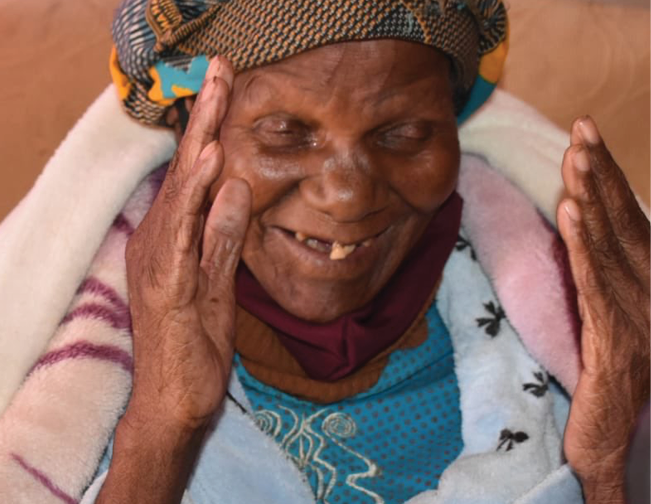
Recently, 119-year-old Nomamelika Philiso of Mandleni village in KwaBhaca in the Eastern Cape received her first dose of the Pfizer vaccine.
Community health workers visited Philiso’s home during a door-to-door campaign to register those who are over 60 years of age on the Electronic Vaccination Data System (EVDS).
They registered Philiso on the EVDS and not long after she was vaccinated at her home by senior health professional Thobeka Ludidi from Madzikane KaZulu Hospital.
Ludidi first screened Philiso before administering the vaccine.
Happy and grateful
Philiso expressed gratitude to government for ensuring that she benefited from the vaccination programme.
“I am short of words. I am just happy and grateful,” she says.
While Philiso’s husband passed away in 1964 and eight of her nine children have also passed away, she is looking forward to spending time with her grandchildren and great grandchildren.
Another recently vaccinated gogo is 101-year-old Chithekile Hlabisa from Mzingazi in Richards Bay.
She received the first dose of the vaccine at Ngwelezana Hospital.
Hlabisa is extremely grateful to have received the vaccine as she spent four weeks in hospital due to the Coronavirus Disease (COVID-19) earlier this year.
Having battled with a heart condition for most of her life, she says it was only by God’s grace that she survived. Unfortunately, one of her daughters succumbed to the disease.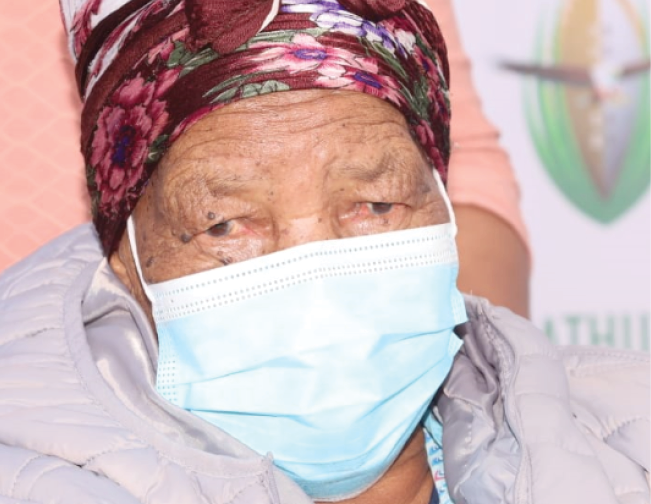
Waiting patiently
Chithekile encourages other senior citizens to take the jab.
“I have been waiting patiently for the vaccine. Having survived COVID-19 and being hospitalised for this virus can be a scary episode.
“I was happy to hear that now we are vaccinating. All people my age and younger than me should take the vaccination as soon as possible.”
While she admits she was initially afraid, Hlabisa says receiving more information about the vaccine put her mind at ease.
Pulling out all the stops
Efforts are being made by various sectors to ensure that as many people over the age of 60 as possible register on the EVDS.
Pension payout points, where thousands of the elderly queue for their monthly grants, are also being targeted.
Jane Simmonds, who works as the Research Manager at the South African Medical Research Council (SAMRC), says she realised that grant queues play a big part in older people's lives.
“Where do you reach old people? They’re not at work©not on public transport or at school. They’re not even going to church much these days because of COVID-19. But they’re living at home and in their communities.”
When she saw that the level of vaccine registration for the elderly was low, Simmonds knew she needed to do something.
She has since rallied the likes of Boxer, South African Post Office and South African Social Security Agency, where thousands of senior citizens gather to collect their old age pension.
Registration
The South African Council of Churches and United Nations Children’s Emergency Fund have also come on board and are sending volunteers to offer a helping hand by assisting pensioners to register.
Simmonds says while a large portion of the elderly have phones, they struggle with poor eyesight and therefore cannot see the screen, type in their information correctly or follow the instructions.
The group is helping the elderly to dial the USSD number (*134*832#), which is free, and fill in their personal details or use their own cellphone to register for the elderly people who do not have a mobile phone.
High hopes
According to Simmonds, this is just the beginning.
“The next step is getting the needles in people’s arms, as it enables them to be safe from COVID-19,” she says. Simmonds adds that the SAMRC is targeting at least one million senior citizens.
Meanwhile, Boxer has started distributing 250 000 flyers in their stores to promote the vaccination rollout.
About 100 000 pensioners collected their money from Boxer in April.
“Going to Boxer, you have an opportunity to reach 100 000 people,” says Simmonds.
Boxer's Head of Stakeholder Relations Ntombi Dludla says the aim is to see as many people being vaccinated as quickly as possible.
“We identified that the first step of registration was critical, yet challenging. We realised that many pensioners come to Boxer each month to collect their grants and we believed it was an ideal opportunity to talk to them about registering for the vaccine.”
Dludla adds that the location of Boxer stores makes them ideal to gain access to many people from difficult-to-reach areas.
Additional reporting by SAnews.gov.za and City of uMhlathuze.
Good health by the cupful
Good health by the cupful SiboneloThe Pebbles Project and UK-based tea company Twinings have teamed up to help farmworkers stay healthy.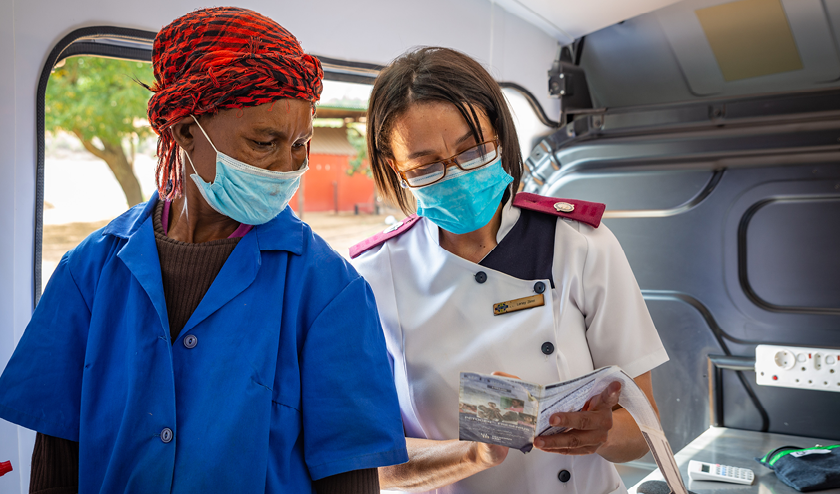
Tea farmworkers and their families, in remote parts of the Western Cape, now have access to healthcare closer to their homes, as a result of a mobile health service in the area.
The mobile clinic was launched by non-profit organisation, the Pebbles Project, and Twinings, a United Kingdom-based tea company, to support around 800 farmworkers and their families on a number of rooibos tea farms in Clanwilliam and Citrusdal.
The mobile clinic conducts wellness screenings and provides routine health check-ups, primary healthcare support and over-the-counter health products.
It will also conduct health and wellness workshops on topics such as family planning, maternal health, hygiene, TB, HIV/AIDS, substance abuse and lifestyle diseases.
Sophia Warner, the Chief Executive Officer of the Pebbles Project, says a lack of access to quality healthcare poses a major challenge for those working and living in farming communities in remote areas where Twinings sources rooibos tea.
“Many farmworkers do not receive regular health check-ups or the medical attention or information they need in time, and consequently suffer risks of more serious health conditions that could have been prevented if treated earlier.”
A lack of information also contributes to health challenges which impacts the farmworkers' ability to work and care for their families.
“The goal of the project is to enable rooibos tea farmworkers to take control of their health and receive the medical support they need,” says Warner.
Albert Smit, from a farm in Jakkalvlei, says the farmworkers are grateful. “We are so happy© As a result of the service, we have less staff having to visit the local clinic and less absenteeism at work,” he adds.
The Pebbles Project’s partnership with Twinings is part of the company’s responsible sourcing programme called Sourced with Care.
Céline Gilart, the Head of Social Impact for Twinings, says Sourced with Care ensures that the company sources responsibly, but also acts as a force for good to improve the quality of life in communities from which it sources.
Govt tackles GBVF
Govt tackles GBVF LondekileGovernment is developing a comprehensive strategy to tackle the scourge of gender-based violence and femicide (GBVF).
Responding to questions in the National Council of Provinces (NCOP) recently, President Cyril Ramaphosa said government is concerned about the killing of women and the trauma they are forced to endure at the hands of men.
“As we move into the second year of the National Strategic Plan, we are focused on strengthening accountability at all levels of government and society.
“We are developing a comprehensive national GBVF prevention strategy, including evidence-based social and behaviour change programmes.”
The National Strategic Plan on GBVF was approved by Cabinet in March 2020.
It focuses on improved accountability, responsiveness to the needs of survivors and a comprehensive prevention agenda.
“We are beginning to see positive results through various joint interventions,” said the President.
In February 2021, the private sector GBVF Response Fund was launched, where an initial amount of R128 million was pledged.
The fund supports organisations that address the challenges women face that make them vulnerable to GBVF.
It allocates resources based on the principles of women empowerment and facilitates funding for women’s organisations in marginalised communities.
Bills addressing GBVF
A key component of the National Strategic Plan is legislative reform.
Recently, the National Assembly passed three bills addressing GBVF. These are the Criminal Law (Sexual Offences and Related Matters) Amendment Bill, Domestic Violence Amendment Bill and Criminal and Related Matters Amendment Bill.
These bills are now on their way to the NCOP.
Access to justice
President Ramaphosa said government has also introduced a number of innovations to increase support to women and access to justice.
“This includes a SMS notification system for applications for domestic violence protection orders, which was launched at all district courts in January 2021.”
The Domestic Violence Amendment Bill, once passed, will make it possible for complainants to apply for protection orders online.
“Thirty-two regional courts are ready for designation as Sexual Offences Courts. There are plans for the establishment of six additional Thuthuzela Care Centres.
“As at March 2021, all police stations had the necessary sexual assault DNA kits to assist victims and survivors,” he added.
The President said the police constantly receive training and retraining to ensure that they are well equipped to deal with the horrific trauma that the women of South Africa endure.
“The National Prosecuting Authority (NPA) has its own challenges of being short staffed, but even the NPA has taken the trouble to train its members so that when they have to prosecute cases of rape and murder of women they are able to do so effectively and efficiently.”
Joint effort needed
The President said the fight against GBVF requires a joint effort from all sectors of society.
“This matter of killing women and the raping of women and young girls is of great concern to all of us and I’d like us to continue handling it jointly, finding solutions jointly, so that we bring GBVF to an end in our country.
“The women of our country are crying out for help; the help of their government, but more importantly, the help of society broadly, to ensure that we remove the scourge of violence against women and children once and for all.”
President Ramaphosa said by working together, key role players can ensure that there is little room left for abusers, rapists and killers to operate in.
“A cohesive society, a society which binds itself together around a set of values and principles, will have greater capability to deal with social challenges, economic challenges and a whole range of others,” he added.
GBV command centre
South Africa introduced the Gender-Based Violence Command Centre (GBVCC), which operates under the Department of Social Development, to assist in fight against GBVF.
The centre operates a national, 24/7 call centre facility. The facility employs social workers who are responsible for call-taking and call referrals.
The centre operates an emergency line – 0800 428 428. This is supported by a USSD, 'please call me' facility: *120*7867#.
Members of the deaf community can make use of the Skype line ëHelpme GBVí. Add ëHelpme GBVí to your Skype contacts
There is also an SMS- based line for persons with disabilities - SMS ëhelpí to 31531.
The centre is able to refer calls directly to the South African Police Service and field social workers, who respond to victims of GBV.
Hepatitis can’t wait
Hepatitis can’t wait LondekileWorld Hepatitis Day raises awareness of viral hepatitis so that people can get treatment.
This year’s theme for World Hepatitis Day on 28 July – ‘hepatitis can’t wait’ – aims to highlight the need to speed up hepatitis elimination efforts, especially during the Coronavirus Disease pandemic.
Hepatitis, which is inflammation of the liver, is often caused by a virus. There are five types of hepatitis – A to E – which can cause a variety of health problems.
Symptoms of hepatitis include fever, fatigue, loss of appetite, nausea, vomiting, abdominal pain, dark urine, light-coloured stools, joint pain and jaundice.
According to non-governmental organisation World Hepatitis Alliance (WHA), viral hepatitis claims thousands of lives every day.
“Stigma, poverty and a lack of knowledge present barriers to the diagnosis and treatment of hepatitis. There are a lot of misconceptions about infection, transmission and treatment of the virus.”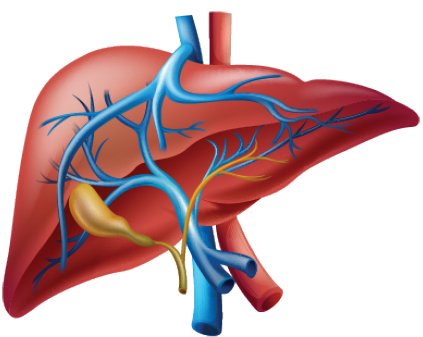
There are an estimated four million people with hepatitis B and 400 000 with hepatitis C in South Africa. Hepatitis C, in particular, affects key populations, especially people who inject drugs.
Soshanguve-based recovering drug addict Koketso Mokubane is one of many who have lived through the stigma associated with being infected with hepatitis.
She says prior to becoming a Peer Officer at the Community Oriented Substance Use Programme (COSUP) South Africa, she experienced a lot of discrimination from health workers.
The virus can be transmitted in various ways, including sexual contact with an infected person; sharing contaminated needles, syringes and other drug injection equipment; and unregulated tattooing.
Mokubane, who was infected by sharing needles while doing drugs, says she received much-needed help from COSUP.
COSUP is the first publicly funded, community-based programmatic response to the use of illegal substances in South Africa. It is implemented by the University of Pretoria in four Tshwane Metropolitan Municipality regions.
“Thanks to the harm reduction programme, I am four years clean of drugs and have been cleared of hepatitis C. Of course, this did not happen without its fair share of challenges and hardships,” she says.
If you suspect that you have been infected with hepatitis, contact your nearest clinic or call COSUP at 012 356 3301.
IEC all set for Municipal Elections
IEC all set for Municipal Elections SiboneloThe Independent Electoral Commission of South Africa (IEC) says it is technically ready to conduct the 2021 Municipal Elections.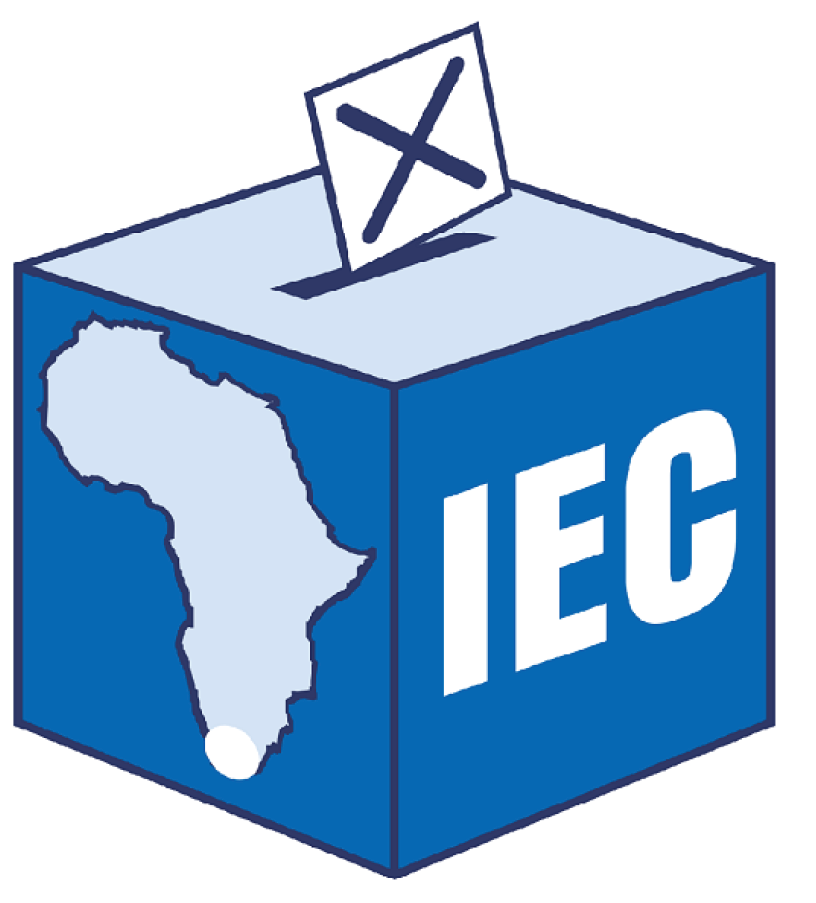
The elections are scheduled to take place on 27 October 2021.
Chairperson of the IEC Glen Mashinini said preparing for the country’s fifth Municipal Elections under uncertain and unpredictable conditions has seen the IEC dealing with one of the most difficult balancing acts in democratic history.
“The Commission is literally walking a tightrope. On the one side is the tyranny of the elections becoming a super-spreader event, leading to further loss of human life.
“On the other side is the tyranny of the failure to adhere to the dictates of our Constitution, leading to democratic backsliding and setting an undesirable precedent for the future. We dare not fall to either side,” he explained.
Technically ready
The IEC believes the 2021 Municipal Elections should proceed as things currently stand.
“Based on the Constitution, the law, operational readiness for the elections and a thorough assessment of the current pandemic conditions, the Commission is of the view that we are technically ready to deliver the elections.
“This assessment was conducted in consultation with health and disaster management authorities and various subject matter experts.”
The IEC has also drawn extensively on the experiences of more than 100 countries and territories around the world that have successfully held elections under Coronavirus Disease conditions.
Mashinini assured South Africans that measures are in place to ensure that the elections are conducted safely.
“These protocols have been developed and tested successfully in over 150 by-elections over the past seven months,” he said.
Mashinini urged all citizens to take part in the elections, saying voting is not just about the IEC, political parties or independent candidates.
“Elections are about ordinary citizens coming together to determine the future of our cities, towns, communities and neighbourhoods in an expression of the will of the people.
Young and first-time voters
The IEC is encouraging eligible voters to register and participate in the October elections through a mobilisation campaign under the theme, ‘Every Voice Together’.
Chief Electoral Officer Sy Mamabolo said a major focus of the campaign is on encouraging young and first-time voters to register and vote in a bid to boost voter registration numbers ahead of the closing of the voters’ roll.
Based on population estimates from Statistics South Africa, it is estimated that 15 million eligible voters remain unregistered.
Currently, the voters’ roll has 25.75 million registered voters.
“Of these, about 60% are under the age of 30. This is not necessarily a reflection of so-called apathy by young people.
“Young voters have had fewer opportunities to register than older voters, with millions only qualifying for registration over the past 24 months since the last major voter registration drive.”
He added that the youth are used to operating in a digital and online environment, and looking for a more convenient and accessible option for registration.
“The IEC is working with political parties within the National Party Liaison Committee to finalise alternative and additional modalities for registration and we hope to make announcements in this regard soon,” Mamabolo said.
Voter registration weekend
The voter registration weekend is scheduled to take place from 17 – 18 July 2021, when all registered voters will be able to check and update their registration details, and new voters can register.
All 23 151 voting stations will open from 8am to 5pm over the weekend.
This will be the only opportunity for voters to register and check their registration status at their voting stations.
However, ongoing voter registration will continue during working hours at local IEC offices until the proclamation of the elections.
Registered voters will still be able to amend their registration details through the 'Click, Check, Confirm' functionality on the IEC’s website.
To register as a voter, citizens must be at least 16 years old and be in possession of a valid South African ID document – either a green barcoded ID book or a smartcard ID.
Voters must be registered at a voting station in the ward in which they are ordinarily resident and must provide an address or detailed description of a place of residence.
However, proof of address (e.g. in the form of a utility account) is not required for registration.– SAnews.gov.za
Eligible voters can find out more about where, when and how to register by visiting the IEC’s website at www.elections.org.za Existing voters can check their registration details on the website or by SMSing their ID number to 32810 (at a cost of R1).
Local is lekker with new laptop
Local is lekker with new laptop LondekileA young entrepreneur is creating an affordable, entry-level laptop for South Africans.
Mpumelelo Mahlangu (27) is taking on international laptop brands as he prepares to launch the first entry-level South African-made laptop.
Born and bred in Soshanguve in Gauteng, Mahlangu started working on his prototype laptop, called Dot Connect, during the hard lockdown in 2020.
With no formal qualification, but ample experience in telecoms, electronics and information technology, Mahlangu says he wants to create a laptop that will make a difference in people’s lives.
“My inspiration came when I realised that with schools closing, movement restricted and many people working or learning from home, the average South African would be left destitute.
“It reminded me of struggling to get through varsity without a laptop and having to depend on internet cafés and computer labs."
He saw a gap in the market and came up with a solution to create an entry-level laptop, a product all consumers would be able to afford.
Mahlangu says Dot Connect Electronics, the holding company, aims to manufacture and service the laptops locally.
“We don’t have a South African-made laptop or TV. We want to penetrate this market and ensure product quality, affordability and job creation.”
As an entry-level laptop, Dot Connect will be able to perform basic day-to-day tasks, such as running programmes like Microsoft Office.
“The device is suitable for browsing the internet and media streaming for an average student. Those who do programming, engineering and graphics will need a more advanced device.
“Dot Connect will have 64GB storage, 128GB dual hard drive, SSD port, 14-inch screen, 400mah battery and a 6GB RAM,” says Mahlangu.
Once launched, Dot Connect is expected to retail for about R5 000.
“The launch date has not yet been announced. One has to do a number of tests to ensure product compliance before it can be registered or accredited by sector education and training authorities and the Independent Communications Authority of South Africa," explains Mahlangu.
He is waiting for feedback from the relevant authorities.
“Our strategy is to be more competitive in price, design and specifications, and create a different way of doing things.”
Mahlangu says it is time for the youth to dream big.
“Always put your head in the game and never allow people to pull you into their negative atmosphere. Most people who always have something to say, know very little,” he adds.
Mawande Sigwinta plants seeds of hope in Strand
Mawande Sigwinta plants seeds of hope in Strand LondekileAn organic food farm is supporting the needy and bringing together a community, while also generating an interest in agriculture.
Mawande Sigwinta (29) is on a quest to restore ubuntu and promote self-reliance in his small community of Strand in the Western Cape.
Sigwinta, who is originally from Sibangweni in the Eastern Cape, established organic food farm I-Afrikayam to provide fresh, nutritious vegetable soup to patients at the local clinic while they wait to collect their medication.
“I-Afrikayam started in July 2019, when we planted the first seeds. I thought an initiative that promotes self-sustainability and self-reliance would be good for the community and restore ubuntu,” says Sigwinta, who is studying towards a PhD.
The soup is made from ingredients grown on the farm and serves as a pre-meal to enhance the efficiency of the patients’ treatment.
“Most treatments require nutritious meals that many people who live below the poverty line cannot afford,” he adds.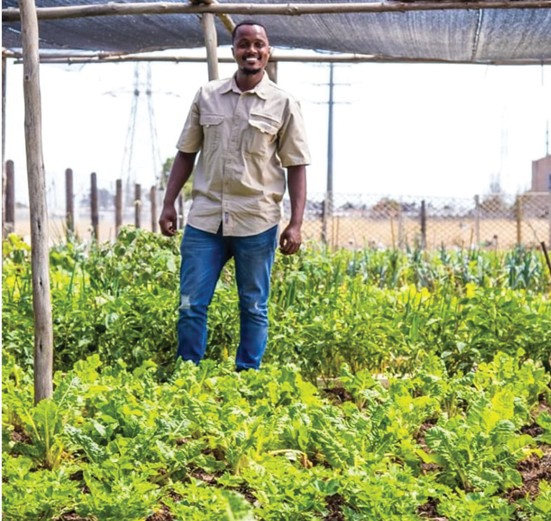
Sigwinta says he also started the farm to attract young people to agriculture.
“Most youth still perceive agriculture as a field for uneducated and poor people.
“Organic farming is very important, but most people are not aware of the health benefits of organically grown vegetables. Those who do know, cannot afford them.”
Sigwinta was awarded R120 000 to start a food security project by the Western Cape Department of Agriculture. He also invested his master’s degree funding to expand the farm.
“To remain self-sustainable, we started by selling packaged and unpackaged vegetables to the informal market. We also run a restaurant, where we sell meals that are prepared from our harvested vegetables,” he says.
As with any new enterprise, Sigwinta has endured some challenges along the way, including access to smallholder farm funding for infrastructure, agri-processing and operating equipment, marketing tools and labour.
“Due to a lack of funds, I have to do everything myself. Sometimes friends and non-profit organisations assist on a voluntary basis, as I cannot afford to pay salaries.”
Despite these challenges, Sigwinta continues to forge ahead.
“Many households have bought into the idea of self-sustainability and self-reliance through agriculture, and vegetable cooperatives have been developed by ordinary community members.
“We have converted a hopeless piece of land into a people’s go to space for hope restoration,” he says.
Mpho Moteka helps others earn a living
Mpho Moteka helps others earn a living LondekileA young farmer says job creation is one of his most meaningful milestones.
Mpho Moteka (26), from Qwa Qwa in the Free State, says his passion for agriculture motivated him to establish a farming business to create jobs for locals.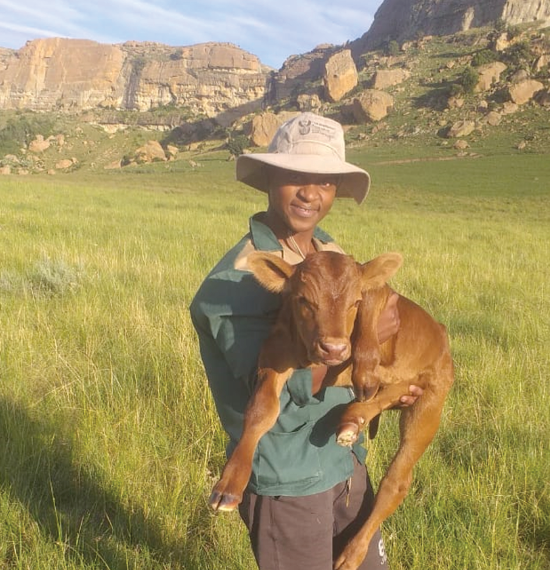
He is the founder and Chief Executive Officer of Harrismith-based Sterkfontein Farm, which is about 20 kilometres from his hometown.
“I established the business in 2017. It comprises an egg production enterprise that has 300 layers, which are at 80% laying point; a broiler production enterprise, with 700 broilers; and a beef production enterprise, with seven Bonsmara cattle and seven mixed cattle,” says Moteka.
The products sold include day-old chicks, six-week-old broiler chickens, eight-week-old live broiler chickens and consumable eggs.
“We also offer other products, including vegetables, such as cabbage and spinach, and beef,” he adds.
Moteka’s products are distributed in both the formal and informal markets.
Through the business, he has created five permanent jobs and also hires seven seasonal workers.
Moteka believes that job creation is one of the meaningful milestones he has achieved so far.
He says his business has benefited from government’s Illema-Letsema and Recapitalisation Programme, through the Free State Department of Agriculture and Rural Development.
The national Illema-Letsema and Recapitalisation Programme aims to support emerging farmers. It provides farmers with production inputs, but in a grant format, to encourage optimum production in all agricultural projects, particularly those in communal areas.
“The funding really assisted in increasing production for both our broiler and beef productions,” says Moteka.
How to apply
The department says farmers must keep a look out for its advertisements, published in various media, before they can apply.
Once an application for funding has been advertised, farmers who meet the criteria can submit applications to the department’s district offices and they will be assisted by an agricultural advisor in their town.
Agricultural advisors will present applications to the provincial office, where a decision will be made.
For more information, contact the Free State Department of Agriculture and Rural Development at
051 861 8311.
Partnership helps develop e-learning
Partnership helps develop e-learning LondekileAn information and community technology (ICT) multimedia centre has been launched by government and the MTN SA Foundation to assist learners with e-learning, including those who are visually impaired. 
Higher Education, Science and Innovation Deputy Minister Buti Manamela and the MTN SA Foundation unveiled the centre at Sekhukhune Technical and Vocational Education and Training (TVET) College in Motetema, Limpopo, recently.
The 40-seater multimedia centre includes a refurbished lecture room, individual workstations, interactive whiteboards with accessories, offline digitised educational content and interactive learning content.
Speaking at the launch, Deputy Minister Manamela said the Coronavirus Disease (COVID-19) forced the department to reimagine the functioning of public academic institutions.
“The COVID-19 outbreak continues to disrupt teaching and learning in the post-school education and training (PSET) system.
“This requires not only the evolution of online learning, but also a revolution to bridge the digital divide in learning and establishing ICT support at colleges for learners with special needs,” he said.
The Deputy Minister added that it is important that ICT resources meet the specific needs of learners and students.
“Our intention is to make sure that no student gets left behind during these turbulent times of the pandemic.
“We also seek to find a sustainable long-term strategy that ensures that the PSET sector does not revert to pre-COVID-19 status in relation to access to online resources by students and lecturers.”
This is the second multimedia centre launched through the partnership.
Earlier this year, a 20-seater multimedia centre was unveiled at Vhembe TVET College’s Makwarela Campus in Sibasa, Limpopo. It caters for deaf, blind and partially sighted students to help them develop digital skills.
Kusile Mtunzi-Hairwadzi, the General Manager of the MTN SA Foundation, said: “The foundation, through various initiatives, aims to bring the power of technology and a connected life to those most in need by contributing to the national quality of teaching and learning.
“This support includes installations of multimedia centres and [the provision of] much-needed e-learning material to rural townships, no-fee-paying and special needs schools.”
Deputy Minister Manamela appealed to the community to take care of the new multimedia centre.
Prevent burns this winter
Prevent burns this winter SiboneloJust as winter brings with it the need to keep warm, it also increases the risk of burn injuries from candles, fires, stoves, heaters and boiling water.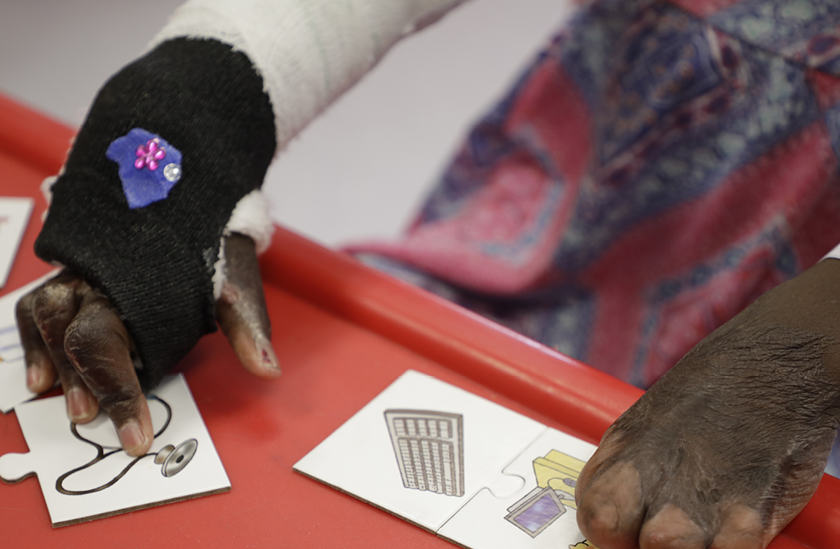
“Burn injuries increase dramatically during winter and parents and caregivers need to be extra careful to ensure their own and their children’s safety,” says Doctor Gary Dos Passos.
He is the Head of the Burns Unit at the Red Cross War Memorial Children’s Hospital (RCWMCH) and an executive committee member of the Burn Society of South Africa.
While accidental fires are inevitable, many burn injuries can be prevented with vigilance, proper adult supervision and safer practices.
“Flame burns are devastating injuries with substantial lifelong physical and psychosocial consequences for the affected survivors and their families,” says Dr Dos Passos.
How to prevent burns
Burn injuries can be prevented around the home. Here are some tips:
- Keep matches, lighters, accelerants (petrol and paraffin), candles, gas and paraffin lamps and heaters out of children’s reach.
- Do not throw accelerants onto flames. This is extremely dangerous.
- Do not let children play near paraffin or gas lamps or heaters.
- Do not hold a child while cooking or leave children unsupervised in or near the kitchen.
- Ensure the kettle is out of reach. Buy a cordless kettle if you can.
- Do not carry urns or pots of boiling water around near children.
- Turn pot handles away from the front of the stove.
- Put candles in a deep glass bottle with sand at the bottom so that they will go out if they fall over.
- Do not cover fires with sand. The heat stays in the sand for hours.
- Put cold water in the bath first, and then add hot water. Always test the bath water with your elbow first.
If you sustain a burn injury involving flames, stop, drop to the ground and roll to put out the flames.
“Heat from a fire, hot water or electrical burn will continue to burn the tissue long after the contact is removed.
“Stop the burning by keeping the burnt body part under cold running tap water for 20 minutes. Do not use ice, ice water, butter or any oil-based product on a burn,” says Dr Dos Passos.
For more burn prevention tips, visit www.childsafe.org.za
Save money for emergencies
Save money for emergencies SiboneloIt’s important to put some of your salary aside so that you have money for unforeseen expenses.
Savings Month, commemorated annually in July, is even more important this year due to the financial hardship many people are facing because of the Coronavirus Disease.
When the pandemic started in South Africa, many people could not go to work due the national lockdown.
While some people still received their salary or were able to claim from the Unemployment Insurance Fund, others had no income and had to rely on their savings.
Financial literacy socialite and author Nicolette Mashile encourages people to set up an emergency fund so that they have some money available during hard times.
“An emergency account stops you from taking out any unplanned and usually very expensive credit.
“Generally, you need money for extra things, like home repairs, and end up taking expensive credit because you didn’t plan or save for them,” she says.
It is up to individuals to decide how much to keep in their emergency fund. Mashile adds that it is important not to spend any of that money unless it’s an emergency.
The South African Savings Institute (SASI) provides the following tips on how to boost your savings:
- Have a clear budget for your needs every month. Create a budget using the free SASI budget tool or phone apps.
- Use free online tools to track your spending and debt and know where every cent of your money goes.
- Pay cash and do not become trapped by easy credit.
- Visualise what you want to save for and start saving more.
- Service your debt and stick to the payment terms. If you cannot pay your monthly debts discuss your situation with your credit providers before it is too late.
To encourage South Africans to save, government introduced a tax-free savings account in 2015.
You can ask your bank to open one for you. You will not pay any tax on the money in the account, but can only contribute a maximum of R36 000 per tax year and R500 000 in your lifetime.
To learn more about saving, visit: www.savingsinstitute.co.za
The youth are our greatest asset
The youth are our greatest asset SiboneloOn June 16th 1976, the youth of Soweto and other parts of the country rose up against the iniquity of Bantu Education.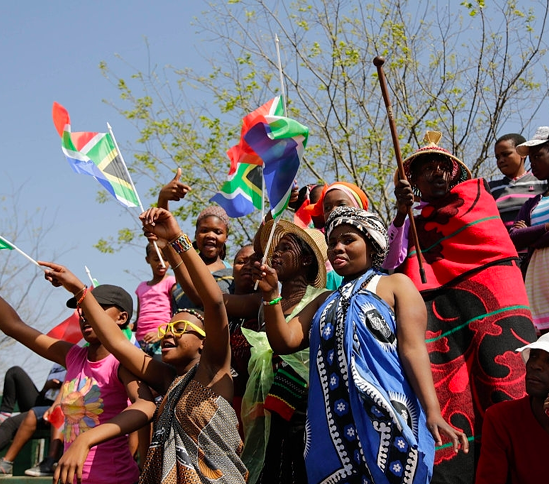
On that day and in the days that followed, many lost their lives. They were killed by a callous regime that had little regard for black lives and thought nothing of opening fire on unarmed, uniformed schoolchildren.
events hardened international opinion against the apartheid regime and gave further impetus to the liberation struggle.
Young people have always been at the forefront of social protest, from the anti-authoritarian protests in Latin America in the late 1950s, to the protests across Africa in the late 1960s.
History faithfully records the contribution of the generation of 1976 to the international student movement and its stance against oppression and injustice.
This historic event 45 years ago continues to be commemorated across Africa and the world.
It is therefore disturbing that knowledge of June 16th is diminishing among young South Africans. This is particularly so among the so-called Generation Z, or young people born between 1997 and 2015.
The 2019/2020 South African Social Attitudes Survey published by the Human Sciences Research Council found that close to 40% of Generation Z has not heard of the historical events of June 16th. A similar percentage has heard about it but knows very little or nothing about it.
Nevertheless, the survey also found that young people of this generation are open to learning about key historical events and believe in their continued importance.
We need to do more as a country to ensure that the message of 1976 is transmitted faithfully.
This is a collective responsibility of government, schools, tertiary institutions, parents, families, musicians, artists, and all of society.
The generation that was born after apartheid ended inherited a country with a democratic Constitution and where fundamental freedoms are protected.
The opportunities young black people have today are both vastly different and greatly improved.
Keeping the story of June 16th alive is a reminder to today’s generation of the great sacrifices made to secure their freedom.
Youth Day is a reminder of the immense power and agency that young people have to create a better future for themselves.
The struggles of young people in South Africa today are many. Young people have remained at the forefront of activism, whether in pursuit of free education or against social ills like gender-based violence.
Today the greatest struggle young people wage is against unemployment, which has worsened under the COVID-19 pandemic.
Creating more opportunities for young people, and access to these opportunities, is government’s foremost priority.
Everything that we do as a government contributes towards improving the lives of young people.
Tackling youth unemployment requires accelerating economic growth, particularly in labour-intensive sectors, and building the capability of the state to fulfil its developmental role.
We are also driving this agenda through targeted interventions. These include the Presidential Employment Stimulus, which has provided work opportunities and livelihoods support for many young people.
We have launched a range of additional measures to create opportunities, enhance skills development, support young entrepreneurs and enable the full participation of young people in the economy.
This includes the establishment of a National Pathway Management Network, SA Youth, to make it easier for young people to view and access opportunities and receive active support to find pathways into the labour market.
These are among the priorities of the Presidential Youth Employment Intervention, which was launched just weeks before we entered a national lockdown last year and which is now entering full implementation.
The Presidential Youth Employment Intervention was built on the understanding that addressing the youth unemployment crisis requires innovative thinking and strong partnerships across society.
Its ultimate objective is to find models that work, whether in skills development or active labour market policies, and to scale these rapidly to reach as many young people as possible.
Most importantly, it recognises that young people must be at the centre of any effort to boost youth employment. Young people are our greatest asset, and our greatest weapon in this fight.
We salute the resilience of every young person playing their part to build and develop this country.
They are the young people volunteering in our communities, building our country through the Presidential Employment Stimulus, running their own businesses and studying to better themselves.
They are the young people who are forging their own path and bringing their families along with them.
We salute young people who keep working to improve their lives. Young people are doing their part; they need government, and indeed all of society, to do ours.
Our country is going through the most difficult of times, but we are working daily to expand the frontiers of hope.
We are seeing the green shoots of growth in our economy, and are confident this will translate to better opportunities for all. Our task now is to ensure that young people are ready and able to access these opportunities, and to create their own.
Time for crafters to shine
Time for crafters to shine LondekileCrafters across the country have the opportunity to be recognised and rewarded for their work during the upcoming fifth Innibos National Craft Awards.
The competition, which is supported by the Department of Sport, Arts and Culture (DSAC), highlights the vibrant craft sector in the country.
The awards are organised by John-Anthony Boerma and Jan Bhuda of ArtAid Africa.
“From the start, it was our intention to create a platform for crafters to highlight their work and to show the world just how much talent there is in South Africa.
“One of our primary goals was to keep the competition as inclusive as possible, which we achieve by not charging an entry fee and keeping the entry process as simple as possible,” says Bhuda.
DSAC’s partnership with the Innibos National Craft Awards is motivated by the department’s desire to encourage and stimulate creativity and innovation in the craft sector.
This sector has the potential to help people break free from poverty and use their hands to create a livelihood.
Four categories of the awards are aimed specifically at those people who aim to commercialise their work. These are:
- Corporate gifts (items that can be branded for clients).
- Beadwork (traditional or innovative).
- Recycled materials (primarily made from recycled/found materials.
- Souvenirs (items depicting a South African tourist attraction that can be mass produced).
One winner will receive R20 000 in each category.
In addition, a winner and two runners-up will be identified in the once-off category (one-of-a-kind items), and stand to win R50 000, R20 000 and R15 000, respectively.
Entries in all disciplines, from grass-weaving and ceramics to beadwork, wirework, wood, jewellery, paper, fabric painting and printing, quilting, leatherwork, pewter, glasswork, embroidery and mixed media will be accepted.
Entries close on 13 August 2021. Entrants must take a photo of their entry – next to a matchbox for size and scale, and email it to
crafts@innibos.co.za or send it to 071 621 3597 via MMS or WhatsApp.
Terms and conditions are available on the competition’s Facebook page – www.facebook.com/Innibosnationalcraftawards
Your Guide to Electronic Vaccination Data System (EVDS)
Your Guide to Electronic Vaccination Data System (EVDS) SiboneloCitizen age 60 years above need to register for the COVID 19 vaccination through the EVDS self-enrollment platforms.
Steps to register for vaccination if you are 60 years or older.
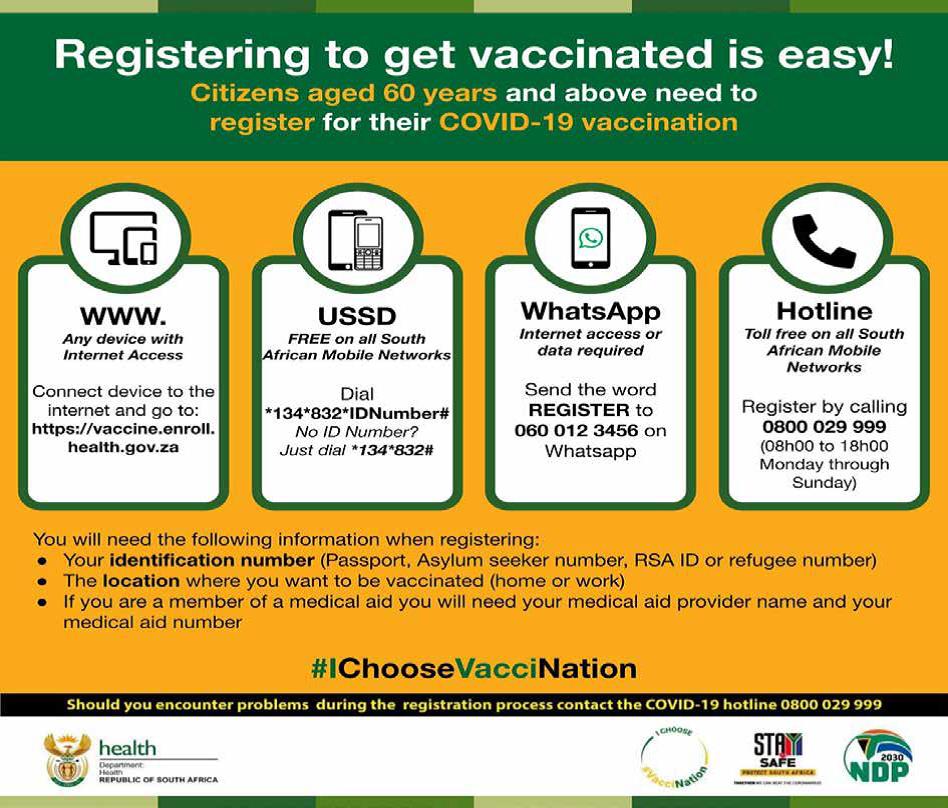
When it is your turn to be vaccinated, the system will send you another SMS with a date and venue for your vaccination.
If you put in the correct address, you will be sent to vaccination center that is closest to your home.
#IChooseVacciNation
Should you encounter any problem during the registration process contact the COVID 19 hotline 0800 029 999
Youth to help fight violence in W Cape
Youth to help fight violence in W Cape LondekileA Youth Safety Ambassador Programme (YSAP) has been launched in the Western Cape to help prevent violence and murder in gang and crime hotspots within the metro and towns across the province.
The YSAP will see 1 000 safety ambassadors placed at different partner institutions, including schools, municipalities, non-governmental organisations and other locations across the province as youth violence prevention facilitators.
The project is part of the violence prevention component of the Provincial Safety Plan.
Safety ambassadors work on initiatives and interventions identified by area-based teams.
Western Cape MEC for Community Safety Albert Fritz, who launched the YSAP in Mitchells Plain recently, said these teams initiate and implement violence prevention interventions in communities where the highest proportion of murder and violence takes place.
“The project is the culmination of months of hard work, starting with a much smaller pilot project from which we learnt many lessons.
“It pulls together different partners, from municipalities around the province to the Western Cape Education Department, non-governmental organisations and other placement institutions,” he says.
The YSAP is also aimed at ensuring that the youth can access opportunities for further career and personal development, through training and other elements built into the programme.
Youth are placed in schools and communities to ensure that their time is taken up by constructive, productive activities and they have opportunities to become role models for other young people.
Britney Ruiters (21) from Mitchells Plain is one of the youth safety ambassadors.
“We see the programme as a stepping-stone to greater opportunities that we would otherwise not have had.
“We are also very excited about making a difference in the community with the violence prevention work we do with young people in the schools where we are placed,” she says.
Since the launch of the programme, the department has hosted YSAP inductions in numerous towns and suburbs.
The ambassadors will earn a monthly Expanded Public Works Programme stipend for the duration of the contract, which will run for six to 12 months.
Zinhle Matthews helps children access their inner hero
Zinhle Matthews helps children access their inner hero LondekileMidrand resident Zinhle T. Matthews (37) has written a children’s book, My Family of Superheroes, that focuses on how positive phrases can help children realise their inner strength and potential.
The book tells the story of Precious who, inspired by her mother, uses positive affirmation to overcome her insecurities and doubts.
My Family of Superheroes is meant to be read by a parent or caregiver to a child. The book features images of Precious, her parents, baby sibling and the family cat dressed as the heroes and heroines of their own story.
Matthews, who was born in Mkhondo in Mpumalanga and grew up in Bethal, first became interested in writing in 2019, but has always known that part of her purpose is to inspire youth.
She says positive thinking is a powerful tool that can empower and help people overcome challenges.
“Although many adults are aware of the power of positive thinking, the benefits of positive affirmation also apply to children,” she says.
It was this realisation, and feeling like she wasn’t living up to her potential, that prompted the mother of two to write a book to help children access their inner hero.
In 2019, she went through a journey of self-discovery and started writing because she didn’t want to forget what she had learnt.
“I wanted to align myself with my purpose. It started from a place of unfulfillment and the goal was to find something that would fill the void. I knew I had a responsibility to find that for myself, from within myself. I am so glad I finally did,” she says.
Matthews hopes to inspire other young women to reach for their dreams, saying the first step is to recognise the power within yourself.
“Confidence comes from within© Sometimes we are afraid of failure, but not trying at all is a guarantee of failure. So I choose to try. I hope you will too,” she says.
The book was released on 24 May and is available from selected stores and Amazon.